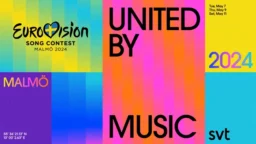Latvian indie rock band Sudden Lights brings a lullaby to the Eurovision Song Contest 2023: Aijā. A song to fall asleep to? Definitely not, and here’s why. A note beforehand: they started writing it after Russia invaded Ukraine.
Drumbeat
An electric drumbeat breaks the silence and starts the song. It sounds loud and slightly experimental. Singer Andrejs Reinis Zitmanis starts singing on top of this bare beat (more about what he’s singing later, the music is already interesting enoug). As soon as he sings his first line, you wonder: huh? What time signature is this?
5/4 and 6/4
The song alternates between two time signatures: 5/4 in the verses and 6/4 in the choruses. 5/4 is a strange time signature. It means that five quarter notes fit into one measure, whereas it would normally be three (in a waltz) or four (in most pop music). It feels like there’s always one beat too many, it’s unstable, asymmetric and stuttering — ‘glitching’ as they call it themselves here. And that creates tension. An intentional tension, ‘The words in the verses stand for the darkness,’ the band members say. Take a look:
Verse (5/4)
You said some words, I couldn’t hear you fall asleep.
The people on TV started speaking louder.
I heard them screaming, it was too dark to see.
This is the first verse. The picture that’s painted here is dark: a room in the dark with a television, and just as the addressee falls asleep, people on the screen start screaming. Is this the start of a war, like the one we see on TV? Is this a transition from peace to panic on the streets, captured by a reporter? Or is it a discussion in a talk show that gets so heated that the camera gets disoriented and eventually gets turned off or falls with the lens down on the floor? It was too dark to see. A scream – what?? From where? Maybe the sounds of war are coming from outside and it’s the narrator who turns up the volume. Why would he do that? The answer to that question can be found in the chorus.
Chorus (6/4)
Don’t cry,
I’ll try to say the right things at the right times
and sing lullabies,
please don’t wake up, please don’t wake up.
‘The chorus,’ Andrejs says, ‘is about easing the pain, and there’s a promise in it.’ It’s more positive. The narrator is looking for a solution, or at least a way to deal with the war, and that is: to keep the addressee asleep, or to protect them from reality. The addressee, who has fallen asleep next to him on the couch, can’t hear or see anything.
The time signature here is 6/4: ‘Stable, calming and familiar,’ the band members themselves explain. It is the perspective of the addressee, because you still think we live in a world so beautiful.
La vita è bella
A comparison can be made with the Italian movie La vita è bella by Roberto Benigni, in which a father and his son end up in a concentration camp during World War II. He tells his son that the camp is a game. If he cries for his missing mother or complains of hunger, he loses points. If he hides from the guards, he earns points. The one who earns a thousand points first, gets a tank. Replace the guards with the Russians. How many fathers and children are playing this game in Ukraine now?
Standing
‘We see how dark events overwhelm the world, we see how evil ruins people’s lives. We couldn’t remain indifferent.’ A clear reason to stand in front of the huge audience of Eurovision (hundreds of millions) and offer comfort. And the fact that this band gets to do it for the Latvian public – because they were chosen in the Latvian pre-selection – says enough about the fame of the band in their own country.
Career
Sudden Lights was founded in 2012, the band members were students at a music school at the time. Through their participation in a talent show in 2015, where their first single Tik Savādi was released, and through their debut album Priekšpilsētas, they have become one of the most streamed musical acts in Latvia. And when it comes to Eurovision, they already came very close once: in 2018, they finished second in the Latvian pre-selection (just behind Laura Rizzotto), with their song Just fine.
Break
Back to the song, and back to the narrator’s attempt to keep the chaos and aggression outside. He can’t do it. After the second chorus, there’s an instrumental break in which the guitars scream around them and seem to fend off the violence. And then the storm passes. And the silence comes. From that point on, Andrejs sings with soft accompaniment in the mother tongue, in Latvian, as is the title.
Aijā
translated: ‘Hush’
Hush, hush,
sleep well
And again:
Hush, hush,
sleep well.
Did the ‘you’ in this story notice anything?
Photo: Ritvars Stankevics/Eurovision.tv






